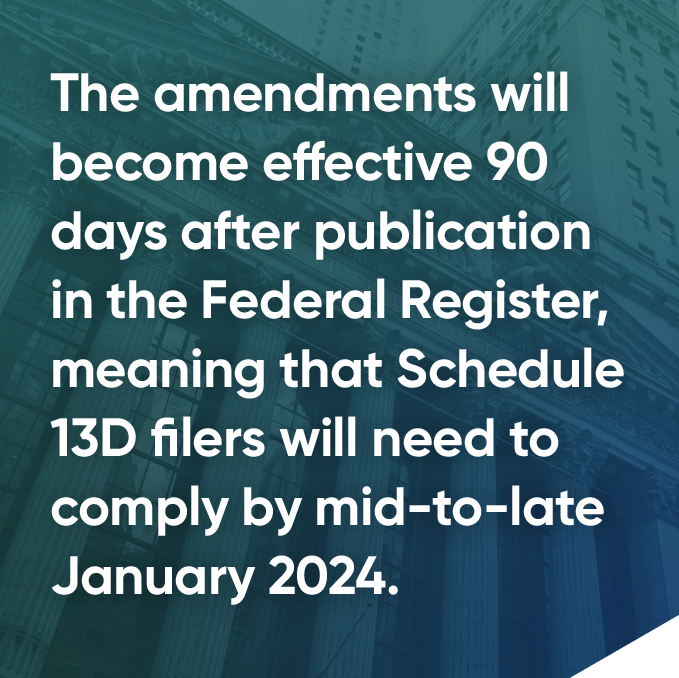How are investors impacted by the modernization of the Beneficial Ownership reporting in the US?
The modernization of the Beneficial Ownership reporting has been a long-discussed topic by the Securities and Exchange Commission (“SEC”) in the U.S. It therefore comes as no surprise that the adoption of amendments to Regulation 13D-G a few days ago is big news, as a large number of investors will have to comply with the updated rules.
But what is beneficial ownership reporting about? Pursuant to Regulation 13D-G and Exchange Act Sections 13(d) and 13(g), an investor who beneficially owns more than 5% of a covered class of equity securities is required to publicly file either a Schedule 13D or a Schedule 13G. Those investors with control intent file Schedule 13D, whilst those investors without a control intent, i.e., Qualified Institutional Investors (QIIs) and Passive Investors, as well as Exempt Investors, file Schedule 13G.
Accelerated filing deadlines will increase costs
SEC Chair, Gary Gensler, highlights the fact that the rules governing beneficial ownership reporting haven’t been amended for half a century, and hence, it is imperative that the filing deadlines are shortened. Such an approach is consistent with the need to reduce information asymmetries in today’s financial markets, as material information will be spread in a more timely manner. At the other end of the scale, by accelerating the filing deadlines for Schedules 13D and 13G, smaller investors will have to pay the price for speedier filings.
The deadlines will be shortened for both initial and amended Schedule 13D-G filings. More specifically:
- The deadline for initial Schedule 13D filings is shortened to five (5) business days, while Schedule 13D amendments will have to be filed within two (2) business days;
- For QIIs and Exempt Investors, the initial Schedule 13G filing deadline is set as 45 days after the end of the calendar quarter in which beneficial ownership exceeds 5% of the covered class;
- For Passive Investors, the initial Schedule 13G filing deadline is set as five (5) business days;
- All Schedule 13G filers are required to file an amendment 45 days after the calendar quarter in which a material change occurred and;
- Schedule 13G amendment obligations for QIIs and Passive Investors are accelerated when their beneficial ownership exceeds 10% or increases or decreases by 5%.
Plus, the filing “cut-off” time is extended to 10 p.m. Eastern time, as a counterweight to the new shortened deadlines.
Disclosure of certain cash-settled derivatives provides clarity as to the calculation requirements
Next to the adopting release, SEC also issued guidance which sheds light on the inclusion of certain cash-settled derivatives, as Schedule 13D disclosure requirements needed clarification in this respect. This practically means that the scope of the beneficial ownership reporting rules is broadened for the sake of transparency. Now, Schedule 13D filers are required to disclose interests in all derivative securities – including cash-settled derivative securities – that use the issuer’s equity security as a reference security. Despite this, opposing voices are raised with regard to the ambiguity of the framework provided[1] which could very well result in incorrect filings.
The term “group” is further analyzed together with its related exemptions
The circumstances under which two (2) or more persons have formed a “group” that would be bound by the obligations arising from the beneficial ownership reporting are also discussed in the guidance. Investors need to be aware of the criteria determining the group formation and for that reason, clarification is given. The mere presence of an express agreement between two or more persons is not the sole factor that suffice for the formation of a group, as concerted actions are required, too, for the purpose of acquiring, holding, or disposing of securities of an issuer. Again, certain questions have been left unanswered, the main one being the importance (or not) of an “express agreement” in the group formation, as it is important for filers not to miss a filing.
The use of a structured, machine-readable data language for Schedule 13D and 13G means additional effort for filers
Schedule 13D and 13G filers would have to devote additional effort to prepare the final report for submission, given that a structured, machine-readable data language will now be required. Under this structured data requirement, only the exhibits to Schedules 13D and 13G will remain unstructured. The use of an XML-based language implies the necessity to gain expertise in preparing these submissions. Third-party vendors equipped with professionally trained staff can be of great assistance to investors in this regard. Nevertheless, from the standpoint of the Commission, all the information received is expected to be analyzed in a smoother manner due to the homogeneity of the data language.
When are investors expected to comply with the amendments?
The amendments will become effective 90 days after publication in the Federal Register, meaning that Schedule 13D filers will need to comply by mid-to-late January 2024. Compliance with the revised Schedule 13G filing deadlines will be required beginning on September 30, 2024. For instance, a Schedule 13G filer will be required to file an amendment within 45 days after September 30, 2024, if, as of end of the day on that date, there were any material changes in the information the filer previously reported on Schedule 13G. Compliance with the structured, machine-readable data requirement for Schedules 13D and 13G will be required on December 18, 2024.
The amendments will become effective 90 days after publication in the Federal Register, meaning that Schedule 13D filers will need to comply by mid-to-late January 2024. Compliance with the revised Schedule 13G filing deadlines will be required beginning on September 30, 2024. For instance, a Schedule 13G filer will be required to file an amendment within 45 days after September 30, 2024, if, as of end of the day on that date, there were any material changes in the information the filer previously reported on Schedule 13G. Compliance with the structured, machine-readable data requirement for Schedules 13D and 13G will be required on December 18, 2024.

However, early compliance with this requirement is welcome, and Schedule 13D and 13G filers may begin to voluntarily comply with the structured data requirement on December 18, 2023.
Check out this short video on Beneficial Ownership and 13GAll in all, these developments seem to modernize the beneficial ownership regime in the US, but, at the same time, add to the complexity of the daily work conducted by in-house compliance teams. Third-party vendors, like Confluence, can assist with the preparation of correct and timely filings with their experienced professionals, as they are closely monitoring regulatory amendments and are well-prepared in advance. Missed, incorrect or late filings can cost investors a great deal of money, but third-party vendors can help them avoid those significant fines imposed by the SEC.
Contact Us Here


